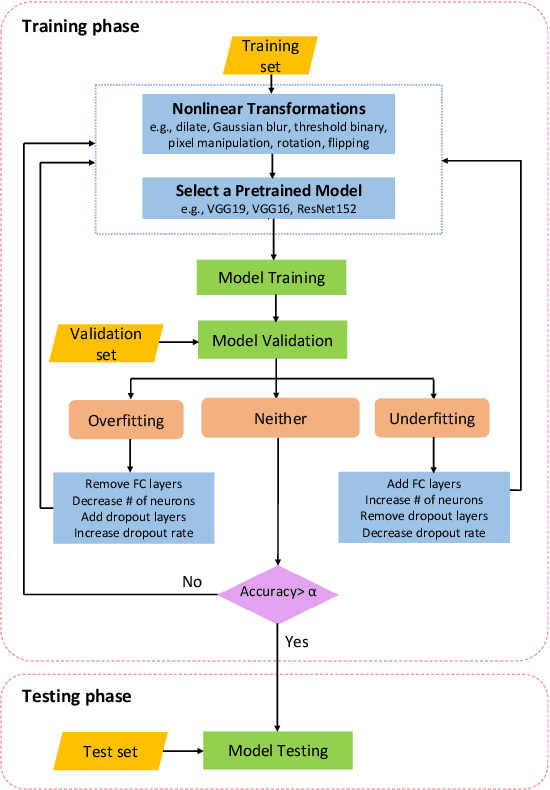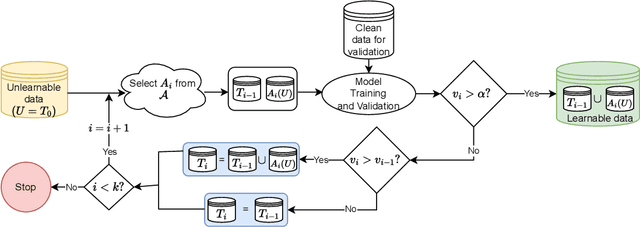Thushari Hapuarachchi
SDN-Based False Data Detection With Its Mitigation and Machine Learning Robustness for In-Vehicle Networks
Jun 06, 2025Abstract:As the development of autonomous and connected vehicles advances, the complexity of modern vehicles increases, with numerous Electronic Control Units (ECUs) integrated into the system. In an in-vehicle network, these ECUs communicate with one another using an standard protocol called Controller Area Network (CAN). Securing communication among ECUs plays a vital role in maintaining the safety and security of the vehicle. This paper proposes a robust SDN-based False Data Detection and Mitigation System (FDDMS) for in-vehicle networks. Leveraging the unique capabilities of Software-Defined Networking (SDN), FDDMS is designed to monitor and detect false data injection attacks in real-time. Specifically, we focus on brake-related ECUs within an SDN-enabled in-vehicle network. First, we decode raw CAN data to create an attack model that illustrates how false data can be injected into the system. Then, FDDMS, incorporating a Long Short Term Memory (LSTM)-based detection model, is used to identify false data injection attacks. We further propose an effective variant of DeepFool attack to evaluate the model's robustness. To countermeasure the impacts of four adversarial attacks including Fast gradient descent method, Basic iterative method, DeepFool, and the DeepFool variant, we further enhance a re-training technique method with a threshold based selection strategy. Finally, a mitigation scheme is implemented to redirect attack traffic by dynamically updating flow rules through SDN. Our experimental results show that the proposed FDDMS is robust against adversarial attacks and effectively detects and mitigates false data injection attacks in real-time.
Securing Traffic Sign Recognition Systems in Autonomous Vehicles
Jun 06, 2025Abstract:Deep Neural Networks (DNNs) are widely used for traffic sign recognition because they can automatically extract high-level features from images. These DNNs are trained on large-scale datasets obtained from unknown sources. Therefore, it is important to ensure that the models remain secure and are not compromised or poisoned during training. In this paper, we investigate the robustness of DNNs trained for traffic sign recognition. First, we perform the error-minimizing attacks on DNNs used for traffic sign recognition by adding imperceptible perturbations on training data. Then, we propose a data augmentation-based training method to mitigate the error-minimizing attacks. The proposed training method utilizes nonlinear transformations to disrupt the perturbations and improve the model robustness. We experiment with two well-known traffic sign datasets to demonstrate the severity of the attack and the effectiveness of our mitigation scheme. The error-minimizing attacks reduce the prediction accuracy of the DNNs from 99.90% to 10.6%. However, our mitigation scheme successfully restores the prediction accuracy to 96.05%. Moreover, our approach outperforms adversarial training in mitigating the error-minimizing attacks. Furthermore, we propose a detection model capable of identifying poisoned data even when the perturbations are imperceptible to human inspection. Our detection model achieves a success rate of over 99% in identifying the attack. This research highlights the need to employ advanced training methods for DNNs in traffic sign recognition systems to mitigate the effects of data poisoning attacks.
Nonlinear Transformations Against Unlearnable Datasets
Jun 05, 2024



Abstract:Automated scraping stands out as a common method for collecting data in deep learning models without the authorization of data owners. Recent studies have begun to tackle the privacy concerns associated with this data collection method. Notable approaches include Deepconfuse, error-minimizing, error-maximizing (also known as adversarial poisoning), Neural Tangent Generalization Attack, synthetic, autoregressive, One-Pixel Shortcut, Self-Ensemble Protection, Entangled Features, Robust Error-Minimizing, Hypocritical, and TensorClog. The data generated by those approaches, called "unlearnable" examples, are prevented "learning" by deep learning models. In this research, we investigate and devise an effective nonlinear transformation framework and conduct extensive experiments to demonstrate that a deep neural network can effectively learn from the data/examples traditionally considered unlearnable produced by the above twelve approaches. The resulting approach improves the ability to break unlearnable data compared to the linear separable technique recently proposed by researchers. Specifically, our extensive experiments show that the improvement ranges from 0.34% to 249.59% for the unlearnable CIFAR10 datasets generated by those twelve data protection approaches, except for One-Pixel Shortcut. Moreover, the proposed framework achieves over 100% improvement of test accuracy for Autoregressive and REM approaches compared to the linear separable technique. Our findings suggest that these approaches are inadequate in preventing unauthorized uses of data in machine learning models. There is an urgent need to develop more robust protection mechanisms that effectively thwart an attacker from accessing data without proper authorization from the owners.
Improving Machine Learning Robustness via Adversarial Training
Sep 22, 2023Abstract:As Machine Learning (ML) is increasingly used in solving various tasks in real-world applications, it is crucial to ensure that ML algorithms are robust to any potential worst-case noises, adversarial attacks, and highly unusual situations when they are designed. Studying ML robustness will significantly help in the design of ML algorithms. In this paper, we investigate ML robustness using adversarial training in centralized and decentralized environments, where ML training and testing are conducted in one or multiple computers. In the centralized environment, we achieve a test accuracy of 65.41% and 83.0% when classifying adversarial examples generated by Fast Gradient Sign Method and DeepFool, respectively. Comparing to existing studies, these results demonstrate an improvement of 18.41% for FGSM and 47% for DeepFool. In the decentralized environment, we study Federated learning (FL) robustness by using adversarial training with independent and identically distributed (IID) and non-IID data, respectively, where CIFAR-10 is used in this research. In the IID data case, our experimental results demonstrate that we can achieve such a robust accuracy that it is comparable to the one obtained in the centralized environment. Moreover, in the non-IID data case, the natural accuracy drops from 66.23% to 57.82%, and the robust accuracy decreases by 25% and 23.4% in C&W and Projected Gradient Descent (PGD) attacks, compared to the IID data case, respectively. We further propose an IID data-sharing approach, which allows for increasing the natural accuracy to 85.04% and the robust accuracy from 57% to 72% in C&W attacks and from 59% to 67% in PGD attacks.
 Add to Chrome
Add to Chrome Add to Firefox
Add to Firefox Add to Edge
Add to Edge